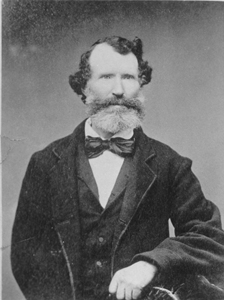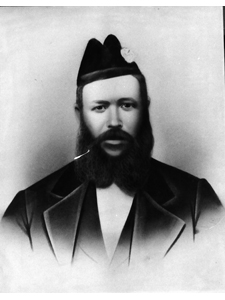
Two men — Samuel Robertson and John McIver — vie for the honour of being the first non-native settler in the district. It seems most likely that Robertson was first by several months, taking up land on the Albion flats east and south of Kanaka Creek. McIver looked to the west to the land which is now Maple Ridge Golf Course in Hammond.
Sam Robertson was our local “Johnny Appleseed”. Even before he took up his land grant, he was crossing the Fraser to plant fruit trees on the open ground around the mouth of Kanaka Creek. His were the first bearing orchards in the province that were not owned by the Hudson’s Bay Company.
When his first wife Julia died, leaving him with two young sons and a daughter, he remarried to the widow of William Edge, the man killed by the Haney landslide of 1880. He and Harriet Mighton Edge had no further children of their own but together they raised both sets of children from their first marriages.
Sam took part in the gold rush by taking the sternwheeler to Yale, walking the nearly 400 miles to Barkerville, panning for gold for several months, and then walking back to Yale to re-board the steamer. He kept a diary of that journey and of his day-to-day working life which is very instructive about life around the turn of the 20th century.
When Sam returned, he had enough gold to increase his land holdings to 800 acres, which included all of the land from Kanaka Creek to well east of what is now 240th Street.

John McIver was a cooper at Fort Langley before he took up his land grant in 1859. He named his farm “Maple Ridge” after a prominent row of maple trees on the ridge above the river.
John was a great booster for the district that lay between the Pitt and Stave Rivers and worked to see it incorporated. He encouraged other men to take up land here. He also appears to have used the name “Maple Ridge” to refer to the district as a whole for some time before it was made official. In 1874, when he hosted a meeting at which the decision to incorporate was made, the name was also made official.
McIver was a hard-working man. His daughter, Mrs. J. C. Macfarlane, would later recall his rowing from his home to Burrard Inlet to catch herring to salt for winter.